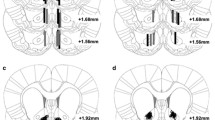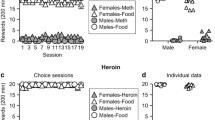Abstract
Rationale and objectives
Previous research with an animal model of relapse has shown that acute food deprivation will reinstate extinguished drug seeking. Recent evidence with humans, however, suggests that chronic food restriction rather than acute food deprivation is related to increases in drug taking and relapse, emphasizing a need for an animal model to elucidate the neural mechanisms mediating the effects of chronic food restriction on drug seeking. Here we studied the effects of chronic food restriction during a period of abstinence on heroin seeking in rats.
Methods
Rats were trained to self-administer heroin over 10 days (0.1 mg/kg/infusion; i.v.). Rats were then removed from the operant conditioning chambers and exposed to a mild food restriction (resulting in 10–15 % decrease in body weight) or given unrestricted access to food for 14 days while abstinent. The abstinence period was followed by a drug-seeking test under extinction conditions. Subsequent experiments manipulated the length of restriction and test conditions.
Results
Rats that were food restricted throughout the abstinence period demonstrated a robust increase in cue-induced heroin seeking compared to sated rats. Re-feeding prior to testing or decreasing the length of the food restriction period prevented the augmentation of drug seeking.
Conclusions
A combination of chronic food restriction and a concurrent state of hunger appears to be necessary for an increase in cue-induced heroin seeking following abstinence. The procedure presented here may serve as a useful model to study the increased risk for relapse following dietary manipulations in abstinent subjects.








Similar content being viewed by others
References
Badiani A, Belin D, Epstein D, Calu D, Shaham Y (2011) Opiate versus psychostimulant addiction: the differences do matter. Nat Rev Neurosci 12:685–700
Bellisle F, McDevitt R, Prentice AM (1997) Meal frequency and energy balance. Br J Nutr 77(Suppl 1):S57–S70
Carr KD (2002) Augmentation of drug reward by chronic food restriction: behavioral evidence and underlying mechanisms. Physiol Behav 76:353–364
Carr KD (2007) Chronic food restriction: enhancing effects on drug reward and striatal cell signaling. Physiol Behav 91:459–472
Carroll ME, Meisch RA (1981) Determinants of increased drug self-administration due to food deprivation. Psychopharmacology 74:197–200
Carroll ME, Meisch RA (1984) Increased drug-reinforced behavior due to food deprivation. In: Thompson T, Dews PB, Barrett JE (eds) Advances in behavioral pharmacology. Academic Press, New York, pp 47–88
Carroll ME, France CP, Meisch RA (1979) Food deprivation increases oral and intravenous drug intake in rats. Science 205:319–321
Carter BL, Tiffany ST (1999) Meta-analysis of cue-reactivity in addiction research. Addiction 94:327–340
Cheskin LJ, Hess JM, Henningfield J, Gorelick DA (2005) Calorie restriction increases cigarette use in adult smokers. Psychopharmacology 179:430–436
Childress AR, Ehrman R, Rohsenow DJ, Robbins SJ, O’Brien CP (1992) Classically conditioned factors in drug dependence. In: Lowinson JW, Luiz P, Millman RB, Langard G (eds) Substance abuse: A comprehensive textbook, 2nd edn. Williams and Wilins, Baltimore, MD, pp 56–69
Cummings DE, Naleid AM, Figlewicz Lattemann DP (2007) Ghrelin: a link between energy homeostasis and drug abuse? Addict Biol 12:1–5
de Wit H (1996) Priming effects with drugs and other reinforcers. Exp Clin Psychopharmacol 4:5–10
de Wit H, Stewart J (1983) Drug reinstatement of heroin-reinforced responding in the rat. Psychopharmacology 79:29–31
Drazen DL, Vahl TP, D’Alessio DA, Seeley RJ, Woods SC (2006) Effects of a fixed meal pattern on ghrelin secretion: evidence for a learned response independent of nutrient status. Endocrinology 147:23–30
Epstein DH, Preston KL, Stewart J, Shaham Y (2006) Toward a model of drug relapse: an assessment of the validity of the reinstatement procedure. Psychopharmacology 189:1–16
Figlewicz DP (2003) Adiposity signals and food reward: expanding the CNS roles of insulin and leptin. Am J Physiol Regul Integr Comp Physiol 284:R882–R892
Franklin JC, Shiele BC, Brozek J, Keys A (1948) Observations on human behavior in experimental semistarvation and rehabilitation. J Clin Psychol 4:28–45
Fuchs RA, Branham RK, See RE (2006) Different neural substrates mediate cocaine seeking after abstinence versus extinction training: a critical role for the dorsolateral caudate-putamen. J Neurosci 26:3584–3588
Fuchs RA, Lasseter HC, Ramirez DR, Xie X (2008) Relapse to drug seeking following prolonged abstinence: the role of environmental stimuli. Drug Discov Today Dis Model 5:251–258
Fulton S, Woodside B, Shizgal P (2000) Modulation of brain reward circuitry by leptin. Science 287:125–128
Glendinning JI, Smith JC (1994) Consistency of meal patterns in laboratory rats. Physiol Behav 56:7–16
Hall SM, Tunstall CD, Vila KL, Duffy J (1992) Weight gain prevention and smoking cessation: cautionary findings. Am J Public Health 82:799–803
Hanna JM, Hornick CA (1977) Use of coca leaf in southern Peru: adaptation or addiction. Bull Narc 29:63–74
Krahn D, Kurth C, Demitrack M, Drewnowski A (1992) The relationship of dieting severity and bulimic behaviors to alcohol and other drug use in young women. J Subst Abuse 4:341–353
Maric T, Sedki F, Ronfard B, Chafetz D, Shalev U (2012) A limited role for ghrelin in heroin self-administration and food deprivation-induced reinstatement of heroin seeking in rats. Addict Biol 17:613–622
Meyer RE, Mirin SM (1979) The heroin stimulus: Implications for a theory of addiction. Plenum Medical Book Company, New York
Morton GJ, Cummings DE, Baskin DG, Barsh GS, Schwartz MW (2006) Central nervous system control of food intake and body weight. Nature 443:289–295
Neisewander JL, O’Dell LE, Tran-Nguyen LT, Castaneda E, Fuchs RA (1996) Dopamine overflow in the nucleus accumbens during extinction and reinstatement of cocaine self administration behavior. Neuropsychopharmacology 15:506–514
O’Brien CP (1997) A range of research-based pharmacotherapies for addiction. Science 278:66–70
O’Brien CP, McLellan AT (1996) Myths about the treatment of addiction. Lancet 347:237–240
Papasava M, Singer G (1985) Self-administration of low-dose cocaine by rats at reduced and recovered body weight. Psychopharmacology 85:419–425
Rodefer JS, Carroll ME (1996) Progressive ratio and behavioral economic evaluation of the reinforcing efficacy of orally delivered phencyclidine and ethanol in monkeys: effects of feeding conditions. Psychopharmacology 128:265–273
Schneider JE, Blum RM, Wade GN (2000) Metabolic control of food intake and estrous cycles in syrian hamsters. I. Plasma insulin and leptin. Am J Physiol Regul Integr Comp Physiol 278:R476–R485
Shalev U, Highfield D, Yap J, Shaham Y (2000) Stress and relapse to drug seeking in rats: studies on the generality of the effect. Psychopharmacology 150:337–346
Shalev U, Morales M, Hope BT, Yap J, Shaham Y (2001a) Time dependent changes in extinction behavior and stress-induced reinstatement of drug seeking during heroin withdrawal. Psychopharmacology 156:98–107
Shalev U, Yap J, Shaham Y (2001b) Leptin attenuates acute food deprivation-induced relapse to heroin seeking. J Neurosci 21:RC129
Shalev U, Marinelli M, Baumann MH, Piazza PV, Shaham Y (2003) The role of corticosterone in food deprivation-induced reinstatement of cocaine seeking in the rat. Psychopharmacology 168:170–176
Shalev U, Finnie PS, Quinn T, Tobin S, Wahi P (2006) A role for corticotropin-releasing factor, but not corticosterone, in acute food-deprivation-induced reinstatement of heroin seeking in rats. Psychopharmacology 187:376–384
Sinha R (2001) How does stress increase risk of drug abuse and relapse? Psychopharmacology 158:343–359
Sinha R, Catapano D, O’Malley S (1999) Stress-induced craving and stress response in cocaine dependent individuals. Psychopharmacology (Berl) 142:343–351
Stuber GD, Evans SB, Higgins MS, Pu Y, Figlewicz DP (2002) Food restriction modulates amphetamine-conditioned place preference and nucleus accumbens dopamine release in the rat. Synapse 46:83–90
Sutton MA, Schmidt EF, Choi KH, Schad CA, Whisler K, Simmons D et al (2003) Extinction-induced upregulation in AMPA receptors reduces cocaine-seeking behaviour. Nature 421:70–75
Tobin S, Newman AH, Quinn T, Shalev U (2009) A role for dopamine D1-like receptors in acute food deprivation-induced reinstatement of heroin seeking in rats. Int J Neuropsychopharmacol 12:217–226
Tomiyama AJ, Mann T, Vinas D, Hunger JM, Dejager J, Taylor SE (2010) Low calorie dieting increases cortisol. Psychosom Med 72:357–364
Tschop M, Smiley DL, Heiman ML (2000) Ghrelin induces adiposity in rodents. Nature 407:908–913
Xu B, Kalra PS, Farmerie WG, Kalra SP (1999) Daily changes in hypothalamic gene expression of neuropeptide Y, galanin, proopiomelanocortin, and adipocyte leptin gene expression and secretion: effects of food restriction. Endocrinology 140:2868–2875
Zacny JP, de Wit H (1991) Effects of food deprivation on subjective effects and self-administration of marijuana in humans. Psychol Rep 68:1263–1274
Acknowledgments
This work was supported by the Natural Sciences & Engineering Council Discovery Program (US: 298915), the Fonds de recherche du Quebec-Santé (CSBN), and the Canada Research Chairs program (US). We thank Dr. Barbara Woodside for constructive comments on a previous version of this manuscript.
Author information
Authors and Affiliations
Corresponding author
Rights and permissions
About this article
Cite this article
D’Cunha, T.M., Sedki, F., Macri, J. et al. The effects of chronic food restriction on cue-induced heroin seeking in abstinent male rats. Psychopharmacology 225, 241–250 (2013). https://doi.org/10.1007/s00213-012-2810-1
Received:
Accepted:
Published:
Issue Date:
DOI: https://doi.org/10.1007/s00213-012-2810-1




